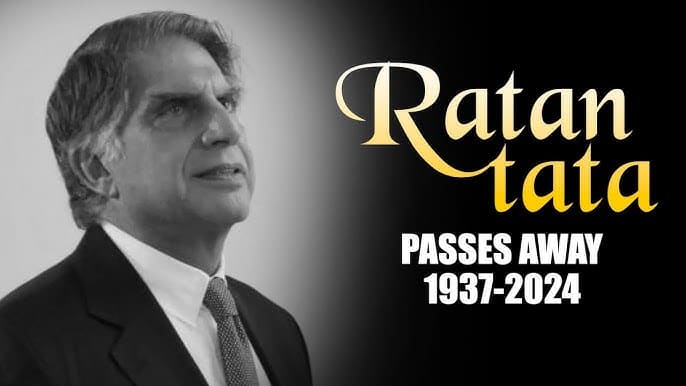Ratan Tata is still alive as of the most recent updates in 2024. He is an iconic Indian industrialist and philanthropist known for his remarkable leadership of Tata Group and his efforts to transform Indian industry. However, I will provide an overview of his achievements and life, highlighting his significant contributions to business and society.
A Detailed Overview of Ratan Tata’s Life and Legacy
Early Life and Education
Ratan Naval Tata was born on December 28, 1937, into one of India’s most prominent business families. He is the great-grandson of Jamsetji Tata, the founder of the Tata Group, which is one of the most respected conglomerates in India. Despite being born into such a legacy, Ratan Tata carved out his path to greatness through hard work, humility, and a relentless pursuit of excellence.
Ratan Tata’s parents separated when he was just ten years old. Afterward, he was raised by his grandmother, Lady Navajbai Tata. He attended Campion School in Mumbai and later completed his graduation in Architecture from Cornell University, USA. He also pursued an advanced management program at Harvard Business School.
Early Career and Entry into Tata Group
Ratan Tata joined the Tata Group in 1961, where he initially worked on the shop floor of Tata Steel in Jamshedpur, shoveling limestone and handling machinery. This experience grounded him in the basics of industrial operations and shaped his approach as a hands-on leader. He gradually moved through various companies within the conglomerate, and in 1991, after a series of leadership roles, he succeeded JRD Tata as the chairman of the Tata Group.
Achievements Under His Leadership
Ratan Tata led the Tata Group for over two decades and transformed it into a global business powerhouse. When he took over, the company was primarily an Indian business with interests mostly confined to India. However, under his leadership, Tata Group ventured into international markets and became a global name.
- Tata Motors and Acquisition of Jaguar Land Rover: One of the most significant milestones during Ratan Tata’s leadership was the acquisition of Jaguar Land Rover (JLR) in 2008. It was a bold move that catapulted Tata Motors into the global automotive market. Despite initial skepticism, JLR became a profitable entity under Tata’s guidance, and this move is widely regarded as one of his masterstrokes.
- Tata Consultancy Services (TCS): During Ratan Tata’s leadership, Tata Consultancy Services (TCS) rose to prominence and became a leader in the global IT services industry. Today, TCS is one of the largest IT service providers in the world, contributing significantly to Tata Group’s overall revenue.
- Tata Nano: Ratan Tata is also credited for his visionary leadership in launching the Tata Nano in 2008, known as the world’s cheapest car. He had a personal interest in making an affordable car for the Indian middle class, though it faced various market challenges. His innovation and efforts, however, earned respect as a breakthrough concept in the automotive world.
- Tata Steel and Corus Acquisition: In 2007, under his leadership, Tata Steel acquired the British steelmaker Corus for $13 billion, making Tata Steel one of the largest steel producers globally. This acquisition placed Tata Steel among the top steel producers in the world, symbolizing the global ambition Ratan Tata brought to the Tata Group.
Philanthropic Efforts
One of Ratan Tata’s most endearing qualities is his focus on philanthropy and social welfare. Even after retiring as chairman of the Tata Group in 2012, he continues to actively contribute to various charitable causes through the Tata Trusts, which control 66% of Tata Sons. His work spans education, rural development, healthcare, and empowering underprivileged communities.
- Education and Healthcare: Tata Trusts have supported educational institutions across India and globally, including IITs and Harvard Business School. Ratan Tata’s commitment to healthcare led to investments in several hospitals and medical research initiatives, significantly improving the availability of healthcare in rural areas.
- COVID-19 Response: During the COVID-19 pandemic, Tata Group and Ratan Tata personally committed significant resources to combat the virus. Tata Trusts contributed over ₹1,500 crore to fight the pandemic, providing funds for protective equipment, testing kits, and setting up medical facilities.
Personal Values and Leadership Style
Ratan Tata is widely regarded as a visionary leader who prioritizes ethics, integrity, and the welfare of society over pure profits. His humility and down-to-earth nature have earned him the love and admiration of millions in India and across the globe.
Even in his personal life, Ratan Tata is known for his simplicity and private nature. Although never married, he has been a role model for many aspiring business leaders due to his empathetic leadership and unwavering dedication to the welfare of society.
Awards and Recognitions
- Padma Bhushan (2000) and Padma Vibhushan (2008): These are two of India’s highest civilian honors, recognizing Ratan Tata’s contributions to trade and industry.
- Honorary Doctorates: He has received several honorary doctorates from institutions such as the University of Cambridge and Cornell University.
Legacy and Post-Retirement Activities
Ratan Tata officially retired as chairman of Tata Sons in 2012, making way for his successor, Cyrus Mistry. However, even after retirement, he remains active as Chairman Emeritus and continues to offer valuable advice to the company. He is also involved in investing in startups through RNT Associates and actively participates in mentoring young entrepreneurs.
In recent years, Ratan Tata has also become a prominent voice in supporting innovation and entrepreneurship in India. He is known to have invested in various Indian startups, ranging from technology companies to social enterprises.
Conclusion
Ratan Tata’s life and career reflect a deep commitment to integrity, innovation, and humanity. His leadership has expanded Tata Group’s reach globally and set a high bar for corporate ethics and social responsibility. He remains a towering figure in the Indian industry, and his legacy of philanthropy and ethical business practices will continue to inspire future generations.
Stay Tuned With Hawk Daily.


